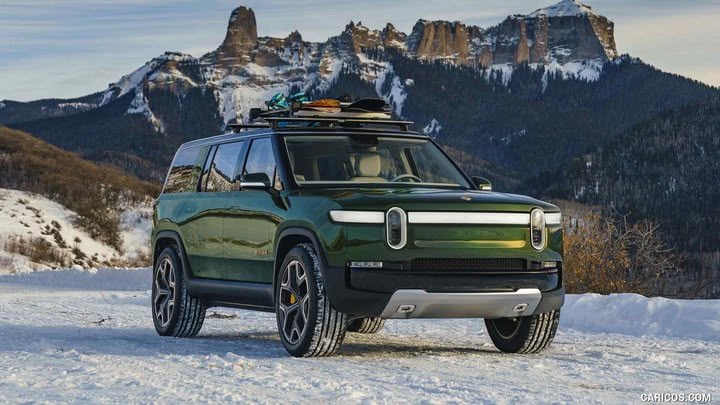China subsidizes its EV makers. Should the US do it too? (The lesson from Tesla)
Photo above - the 2025 Rivian R1S costs $106,000. Which may be why you see so few of them in the wild. Drivers' Ed 101 - please think twice about taking your Rivian EV on a road trip to Alaska - battery range is cut shockingly short by subzero temps.
How much economic advice should we take from a CEO whose company doesn't make money? The last time we did that, Tesla ended up scoring a $7,500 tax credit for each car sold, immediately propelling them from losses to profits. Are we happy with that decision now?
Today’s advice comes from R.J. Scaringe, CEO of EV maker Rivian. The company lost $1.2 billion in 2024, and $2 billion in 2023. They eked out a small profit in the first quarter of 2025. Before you cheer, let’s understand that Rivian only sold 52,000 vehicles in 2024, and expects to sell even less this year.
Some reader with a quick calculator may have already figured out that Rivian LOST $23,000 per vehicle last year. (Check my math). So, when Rivian wants to lecture us about “what’s wrong” with America’s EV industry, this should be taken with a grain of salt, no?
According Mr. Scaringe, China’s secret sauce is . . . government subsidies of their nation's EV cars. He doesn’t come right out and beg for US subsidies to Rivian, but what else could possibly be on his mind? Hey, Mr. Scaringe . . . we already installed umpteen thousands of public chargers at government expense. Because someone said "range anxiety" was the problem. Now you want us to hand even MORE money directly to your corporate treasurer?
Rivian Automotive Inc went public in 2021 at $128 a share. Those shares are down 90% today, at $13.XX. The investment community renders a new verdict on every corporation at the close of each trading day. Thowing tax money at corporations which chronically underperform is NOT going to rehabilitate the falling reputation of capitalism. No more subsides, whether that company is named Tesla, Rivian, Ford, or GM. (I'm not a fan of tariffs either). Automakers should live or die based on their product lineup and pricing. Otherwise they have no incentive to get it right.
Rivian CEO Scaringe really nails it halfway through his Business Insider magazine interview, though. He admits that Rivian – and every other EV company in America – will NEVER be able to compete with China because of wages/assembly cost. The average Chinese car assembly line worker makes 100,000 yuan ($12,000 USD) a year. That’s 10% of what America pays UAW workers – before pension benefits, healthcare, overtime, etc. There’s no way handing out free taxpayer money to Rivian or Ford or Chevrolet is EVER going to bridge that chasm.
In fact, if the government does give taxpayer dollars to EV manufacturers, they’re still going to lose money, and we’re simply subsidizing the salaries of those $140,000 a year union guys wielding screwdrivers and pliers.
Sorry Mr. Scaringe (and any other EV fanboy readers who want their toys subsidized) - if you want to compete with China, you’ll have to do it with automation and robots. Not with handouts to people already making double what the average US worker earns.
I’m just sayin’ . . .
Rivian CEO says Chinese EV makers aren't doing something 'magical' to achieve cheaper vehicles
Automotive Worker Salary in China (2025) - SalaryExpert
Rivian Releases First Quarter 2025 Financial Results - Newsroom - Rivian
31-35, F


